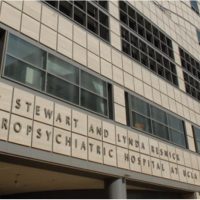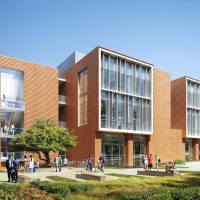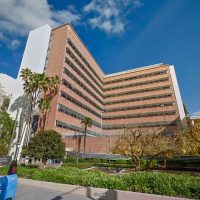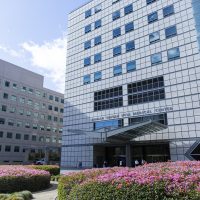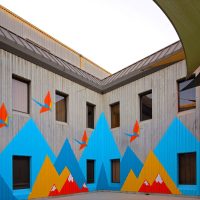Research Track
The UCLA Division of Child and Adolescent Psychiatry, a clinical, research, and training Division within the Semel Institute, offers a 3-year, integrated clinical and research fellowship program. This Research Track not only provides high quality clinical training but also focuses on training researchers in the area of translational intervention science for child mental disorders to prepare them to become independent transdisciplinary investigators.
Research track fellows will perform mentored independent research, receive formal didactic and experiential training in a designated area of research, as well as training in ethical issues in research involving children and families. The ultimate goal of the fellowship training experience is the transition into full-time academic research positions.
We accept applications with research interests across the broad spectrum of child, adolescent and family interventions research, including, but not limited to:
- translational methods
- mechanisms or biomarkers of treatment outcome
- clinical trials methodology
- treatment dissemination and service utilization
The program takes advantage of the strengths of the Division and Department’s 35 specified faculty mentors, a broad array of research programs and centers, and a wealth of extramurally funded treatment studies to provide a diversity of training opportunities. Strengths include both psychosocial and biomedical intervention science, from early childhood intervention to neurostimulation. Trainees and program directors identify two mentors, a primary mentor who is expert in the individual’s specific area of interest, and at least one secondary mentor who broadens the trainee’s translational capability and perspective. Mentors can include individuals from other UCLA departments. Located on the UCLA campus, the program also utilizes the wealth of other training resources available in the broader campus community, including obtaining training through the UCLA Clinical Translational Science Institute (CTSI.ucla.edu) Training Program in Translational Research, coursework available through Psychology, Public Health, Biostatistics Departments, and an array of other advisors, laboratories, seminars, and patient populations.
The T-32 program also supports 2-year postdoctoral research fellowship positions in child and adolescent mental health treatment research, open to MDs and PhD researchers.
Leadership

John Piacentini, PhD, ABPP
Co-Director, NIMH T32, Postdoctoral Research Training Fellowship in Child Mental Health Intervention Research

Suma Jacob, MD, PhD
Co-Director, NIMH T32, Postdoctoral Research Training Fellowship in Child Mental Health Intervention Research
Research Track Child and Adolescent Psychiatry Fellows
Year 1

Margaret Yau, MD, MS
First Year Research Track Fellow
University of California, Berkeley (BS)
University of California, San Diego (MS),
University of California, Riverside (MD)
University of California, Riverside
Neurodevelopmental disorders, ACEs, early intervention, and JEDI
During the first year, the research track fellow gains similar experience in hospital-based settings as the traditional clinical track fellows but in abbreviated rotations, along with two outpatient clinics, and attends all the Year 1 Lectures along with the Clinical Track fellows.
During the first half of Year 1, research track fellows complete three 2 month-long clinical rotations, which are full-time clinical services.

Child & Adolescent Psychiatry Inpatient Service
Location: The Stewart and Lynda Resnick Neuropsychiatric Hospital at UCLA (RNPH)
Inpatient Faculty: Artha Gillis, M.D., Ph.D., Brandon Ito, M.D., MPH, Manal Khan, M.D., Krista Tabuenca, Ph.D., Sabrina Reed, M.D., M.A., Stuart Murray, Ph.D., Psy.D.
The Child and Adolescent Psychiatry Inpatient Service is where fellows become part of one of the best inpatient multidisciplinary teams in the nation, gaining clinical experience in the management of severe child and adolescent psychiatric disorders side by side experienced psychiatrists, psychologists, social workers, occupational therapists, nurses, educational specialists, recreational therapists and more. Fellows provide individual psychotherapy and medication management for patients typically ranging from 10-17 years old, in addition to family therapy and parenting support. Case conferences as well as individual and group supervision contribute to fellows’ training during this rotation.
During this 4-month rotation, fellows will:
- Serve as case coordinator and manage all aspects of treatment for children and adolescents on the inpatient wards including individual psychotherapy, psychotropic medication, and at least one family therapy session per week, typically with the social worker as co-therapist.
- Be responsible for psychiatric management and psychosocial interventions for acute patients presenting with childhood disorders such as mood and anxiety, psychotic, substance related, eating, somatoform, and sleep;
- Provide treatment for school-aged and adolescents from diverse cultures, using treatment modalities including family therapy, group therapy, supportive, psychodynamic, cognitive behavior therapy (CBT), and psychopharmacologic therapy
- Collaborate with other professionals and learn such skills as interpreting psychological testing, assessing school, legal, and community needs.
ABC Young Child Partial Program KidsConnect (Early Childhood PHP)
Location: UCLA Semel Institute
ABC Faculty: Benjamin Schneider, M.D. and Tara Peris, Ph.D.
KidsConnect Faculty: Tanya Paparella, Ph.D., Stephanny Freeman, Ph.D., Robert Suddath, M.D.
It is on the ABC rotation where fellows fully delve into the world of young children and learn the fundamentals of evaluating and treating children 6-12 years old in a partial hospital setting. Our young patients present with a wide variety of psychological and developmental conditions such as Autism Spectrum Disorders, ADHD, OCD, Anxiety and Mood Disorders, genetic syndromes, and challenging difficulties with impulse control and emotional regulation. Fellows will coordinate the care of child partial hospital patients through treatment planning meetings, psychiatric attending rounds, and learning how to conduct family and parent training sessions in addition to psychotherapeutic strategies that have been proven effective with children. In addition to cases on the ABC service, fellows will also observe younger children with Autism and other developmental disabilities in the KidsConnect, learning about how therapeutic environments and individualized strategies can help to improve behaviors and communication and socialization.
During this 4-month rotation, fellows will:
- Evaluate school-aged patients with diagnoses including those first diagnosed in childhood, mood, and anxiety disorders;
- Provide treatment of preschool and school-aged children from diverse cultures and varied sociodemographic backgrounds
- Be exposed to treatment modalities of family therapy, group therapy, supportive therapy, CBT for children, and childhood psychopharmacology; collaboration with other professionals; other experiences such as psychological testing
- Consult with pediatricians, schools, regional centers, and other community agencies
Pediatric Consultation-Liaison Psychiatry Emergency Psychiatry
Location: UCLA Mattel Children’s Hospital and Ronald Reagan UCLA Medical Center
Faculty: Jena Lee, M.D., Natacha Emerson, Ph.D., Sabrina Reed, M.D., M.A.
On the CL-ED Rotation, fellows learn the art of being a child psychiatric consultant to pediatric teams for children admitted to the UCLA Mattel Children’s Hospital and to the Emergency Department at the Ronald Reagan UCLA Medical Center. In their role as consultant to Pediatrics, first year fellows complete comprehensive consultations of medically ill children in the inpatient hospital setting. They learn to evaluate consultation requests, manage the physical, interpersonal, and system issues inherent to the psychiatric consultant in a pediatric setting, differentiate pathological from normal behavioral and emotional responses to a medical illness, and work with a multidisciplinary team to devise appropriate treatment plans for children. As consultants to the Emergency Department, fellows learn how to efficiently and effectively assess and manage children and adolescents presenting with acute psychiatric symptoms, including symptoms that can be the initial presentations of chronic and severe psychiatric conditions. Fellows become adept at discerning level of safety risk, managing acute behavioral aggression, legal issues that impact psychiatric care of youth, and medical conditions that can influence psychiatric symptoms.
During this 4-month rotation, fellows will:
- Evaluate preschool, school aged, and adolescent youth who first present to pediatrics or emergency department teams with disorders including adjustment, trauma, mood and anxiety, psychotic, substance related, feeding/eating, somatic symptom, and sleep, or those who undergoing a transplant.
- Provide treatments including crisis intervention, psychoeducation, supportive therapy, parenting and behavioral interventions, coping skills training, and psychopharmacologic treatment recommendations
- Collaborate with pediatricians, emergency physicians, other staff and mental health professionals in managing childhood psychiatric emergencies, acute seriously emotionally disturbed patients, and preschool, school aged, and adolescent youth who are experiencing medical trauma and stress.
During the second half of the year, the research track fellow begins training in the outpatient setting, in two half-day clinics per week, Anxiety Clinic and CAN Clinic. This schedule offers 7 half-days per week during this 6-month period for protected research time.

Year 2

Debha Amatya, MD, PhD
Second Year Research Track Fellow
Stanford University (BS), University of California San Diego (MD/PhD)
University of California Los Angeles
Early detection and intervention for the psychosis prodrome
During the second year, the research track fellow participates in the Pediatric Psychopharmacology Clinic one-half day per week for 12 months, a community mental health clinic for one day per week for 4 months, the School and Forensic Consultation rotations, and KSADS semi-structured assessments. In addition, research track fellows participate in the Year 2 lectures once per week for 12 months. This schedule protects about 7 half-days per week all year for research.

Year 3
During the third year, the research track fellow has 100% protected time for research.








